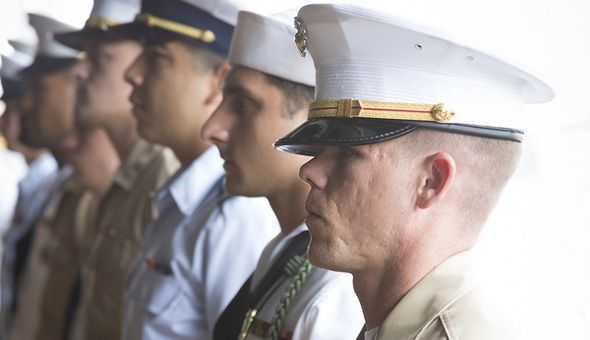The men and women who have served in the United States armed services are among the most selfless and dedicated citizens in the country.
Their service, respect for leadership, and training also make them well-equipped to take on entrepreneurial roles once their military commitments have concluded.
The impact of veterans on the business world is significant. According to a recently released report from the U.S. Small Business Administration, veterans are majority business owners in 2.52 million ventures. Those businesses had receipts totaling $1.14 trillion in 2012 (the most recent year available). Veteran-owned companies employ more than 5 million people with a combined payroll of $195 billion.
Veterans make excellent entrepreneurs for many reasons. A closer look at the skills and attributes they bring to the table brings a deeper understanding to the path from selfless service to entrepreneurial success.
Skills for Success
Here is a closer look at the skills that veterans bring to the table as entrepreneurs.
- Attention to Detail. Military members must be keenly aware of details that allow them to seek out, identify, and address anomalies, focus on accuracy and results, and work with precision.
- Management Know-How. Most military personnel progress during their career, taking on increasing levels of responsibility. With each promotion comes additional management obligations and each of the military branches work to ensure that their members have the skills to manage effectively.
- Creative Problem-Solving. Thinking fast on their feet is a trait common to vets, especially those who have served in combat scenarios. While creativity may not be the first attribute that comes to mind when one thinks of military training, there are countless combat and non-combat situations in which military members come across circumstances that require quick thinking and decisive action.
- Stress Tolerance. In some cases, veterans face multiple high-stress situations every day. Their training and experience prepare them to learn how to identify stress, develop and use coping methods, to work calmly through the stress.
- Adaptability. Veterans had to adapt to new situations, new leaders, new challenges, and new environments on a regular basis, oftentimes in rapid succession. In the military, change is a constant.
- Respect for Leadership. Veterans are keenly familiar with the chain of command. Veterans understand that there is a decided difference between being a boss who is aloof and separated from the action and a leader who understands that leadership means being an engaged part of the team.
- Discipline. Veterans have learned in rigorous and arduous circumstances. To succeed, they need to be disciplined in their respect for command, their focus on the mission, and respect for team members and leaders. That is a trait with lots of applications in the business world.
- Dedication. It takes a special kind of person to commit to years of sacrifice and service to others. That dedication is at the very core of military service. It is also a characteristic that serves veterans well when they leave active duty, especially if they enter the business world.
- Team Focus. Military personnel rarely succeed by acting alone. They need to operate as members of a complex organization, knowing when to follow orders, when to be decisive, how to communicate, and when to act selflessly.
- Integrity. Veterans learn to act at all times with honor, justice, and integrity. This, too, translates well into the business world, where veterans exemplify leadership with integrity.
- Perseverance. Those stories from basic training are true. Veterans had to learn how to march in precision formation, assemble and disassemble a weapon, master unfamiliar equipment, and learn proper procedures. Those skills require discipline and dedication to learn and master a skill.
- Respect for Diversity. In the military, your colleagues come from all corners of the U.S.A. Those myriad backgrounds, experiences, cultures, and perspectives need to mesh, coming together to form a cohesive, mission-focused unit. Veterans understand the value of diversity and its importance in modern society.
- Initiative. As is the case in the business world, day-to-day decisions in the military can become mired in red tape and procedure. Veterans understand how to navigate a complex bureaucracy, whether it is their own or one with which they are interacting. Thus, veterans are accustomed to taking the initiative to work through bottlenecks and find solutions.
- Organization. Military members always need to keep equipment, mission details, living quarters, and workspaces tidy. Good organizational skills help veterans retired from active service manage the complexities of entrepreneurial endeavors.

Employing Veterans Equals Sound Business Sense
According to a paper by the Institute for Veterans and Military Families, hiring veterans makes sense. The reasons for hiring veterans are some of the very same reasons veterans are adept at starting their own businesses. Consider just a few of those reasons below:
- High-performing entrepreneurs and high-performing military personnel share many common traits, including:
- A high desire for achievement
- Familiarity with autonomy
- Comfort with uncertainty
- Effective decision-making in dynamic situations
- Self-reliance
- The Small Business Administration (SBA) has made veteran entrepreneurship a priority, including a set-aside program giving veteran-owned businesses an advantage when it comes to securing government contracts. The agency’s Office of Veterans Business Development provides services designed to maximize the use of SBA programs by veterans, including programs specially designed for women veterans and service-disabled vets.
- Veterans have a high degree of trust in others and instill a sense of trust in others, hallmark traits of entrepreneurial leaders.
- Veterans have a high aptitude for skill transference. Vets know how to translate and apply the skills learned while in uniform to the private sector. This ability may be a result of the military’s focus on contingency and scenario-based training methods.
- Veterans often have advanced technical training, using equipment and technology that is on the cutting edge.
- Change is the norm for veterans and this uncertainty, often found in business environments, is not distressing for vets.
- Veterans’ resilience equips them well to handle high-rejection scenarios often found in entrepreneurship, with its need for funding, product development, sales, and customer acquisition.
- Veterans know how to build great teams. They understand the importance of finding effective team members and defining their roles and responsibilities. They also know how to develop a plan of action and to deploy team members accordingly, with all team members fully aware of the objectives and their role in finding success.
- Veterans are focused on the organization. They know how to connect an individual to the greater good, whether in combat or in business.
Resources for Veterans
Veterans who are interested in entrepreneurial careers have many options when it comes to support organizations. Here are a few examples:
- Boots to Business | Reboot. This SBA-run resource offers veterans entrepreneurial training and education. Boots to Business offers a two-part introductory program on entrepreneurship via a network of training partners.
- Bunker Labs offers educational programming, networking, and resources via regional chapters. This nonprofit organization’s 12-week Entrepreneurial Program for Innovation and Collaboration (EPIC) helps vets test ideas and receive feedback.
- Patriot Boot Camp is a nonprofit organization with a mission to train active-duty personnel, vets, and their spouses about technology entrepreneurship, offering mentorship and training.
- VETCON is a conference bringing together veteran entrepreneurs annually for educational sessions, networking, and inspiration.
- VeteranCrowd offers advice on securing capital in new and growing companies, merger-and-acquisition advisory services, investor relations, contract negotiation, and management issues.
- orgis a newsletter with helpful articles for veterans who own their own businesses.
- The Vet-Biz Network invests in start-up and early-stage veteran-owned businesses.
- Warrior Rising is a nonprofit organization that helps vets learn business fundamentals, participate in a business incubator, receive mentoring and business advice, and secure funding.
Offering a Helping Hand
Many of the organizations noted above are founded by or operated by veterans. This ethos – serving and supporting fellow servicemen and servicewomen – is a thread woven throughout the military service branches. Whether enlisted or commissioned; whether serving in the Army, Navy, Air Force, Marines, Coast Guard or Reserves; and wherever one served, there is a common link among these patriots. That commitment to each other, given selflessly, endures long after the uniforms are put away.
At Benetrends, we offer programs to serve veterans and other entrepreneurs every day. Benetrends helps with the paperwork and financing to meet your needs as a veteran and entrepreneur. In addition, Benetrends offers a full range of programs to help your business run smoothly once it is established, including retirement plan administration, credit card processing, and business insurance.
Benetrends has a long, proud history of helping veterans gain access to financing and services to help them fulfill their entrepreneurial dreams. To learn more about how Benetrends can help you, download “Innovative Funding Strategies For Entrepreneurs”.
